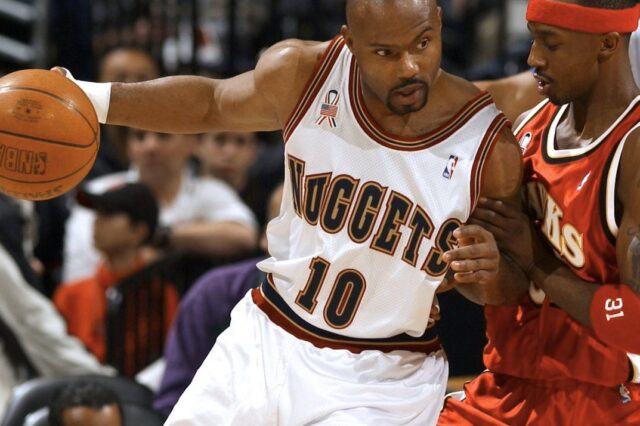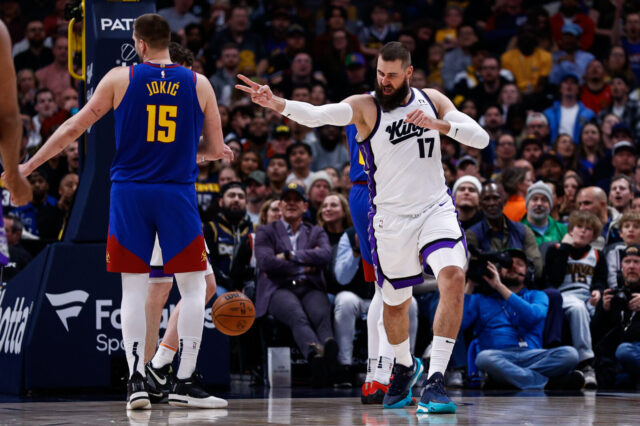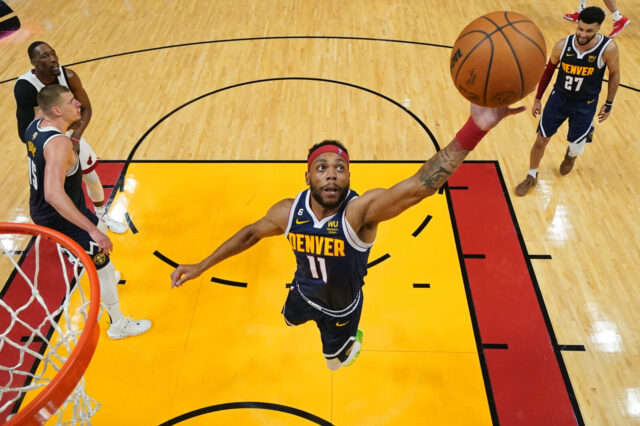Jamal Murray received $170 million this summer to be the Denver Nuggets point guard of the future.
That’s all that anyone wants to talk about these days, the investment and commitment the Nuggets made to Murray, hoping that he will develop into Denver’s next star to pair next to center Nikola Jokic. It’s a good plan, and one that should remain ongoing with both players locked in for several seasons under their new contracts. But what about the rest of the roster?
Two days ago, I detailed Gary Harris and the likelihood of him returning to the elite form he showcased before a rash of injury issues. Yesterday, Zach Mikash discussed the small forward position and the candidates to fill in as the starter and backup. Today, it’s time to discuss another important piece of the puzzle: Monte Morris, the backup point guard behind Murray and an integral piece for Denver’s long term success.
Morris exceeded all public expectations last season, proving that his slender frame wouldn’t prevent him from excelling in many of the same ways he excelled at Iowa State. The NCAA record holder for Assist-to-Turnover Ratio was second in the NBA by the same metric this past season, showcasing advanced handling and decision making the Nuggets so desperately needed. Morris played all 82 games, averaging 10.4 points and 3.6 assists compared to just 0.6 turnovers per game. Among all qualified point guards, Morris played by far the best brand of mistake free basketball, and he was a productive scorer at the same time.
That was the regular season though. In the playoffs, Morris continued to limit his mistakes at an elite level, but the scoring production and efficiency dropped out from under him. The 10.4 points dropped to 5.4 per game, and the biggest offender was the disappearance of his three-point shot. All regular season, Morris shot 41.4% from three-point range, showing a newfound ability to space the floor when he didn’t have the ball in his hands. Without that shooting ability in the playoffs or the requisite size to bother guards and wings like Damian Lillard, CJ McCollum, and DeMar DeRozan, Morris became strictly a backup point guard for when Murray left the floor. This was a new role for Morris, who flourished when given the opportunity to direct the offense, play next to Malik Beasley and Mason Plumlee off the bench, and offer an advantage for the Nuggets every single game. Very seldom did Morris look overmatched at any point during the regular season. He appeared overmatched during playoff competition, averaging just 2.9 points per game against the Portland Trail Blazers and not looking like the player Michael Malone had come to trust in any situation.
Now, one player’s struggles generally aren’t just about a player not playing well, and Denver’s bench unit certainly didn’t play well as a whole, from Morris to Mason Plumlee to Malik Beasley and Will Barton at times. Denver’s entire bench unit was disrupted by playoff competition, but the Nuggets can’t have that happen going forward if they want to win a championship. Contending teams often utilize a variety of bench players in the regular season but shorten the rotation to the most trusted when the going gets tough. For the Nuggets, Morris needs to be one of those guys. The synergy between Jokic and Murray means that the Nuggets are unlikely to stagger their minutes frequently, and Murray isn’t a natural playmaker as it is. Morris is. He thrives on playmaking for others and helping move the ball around.
The long term question about whether Morris can be effective in a playoff series is unfair at this stage in his career. Though he carries himself like a 10-year veteran, this past year was his first full NBA season. The skill level isn’t the question for Morris though. The athleticism and body type are, and as the playoffs become more and more about identifying and exploiting weaknesses, Morris’ size will always be his achilles heel. In the playoff, Morris was blocked eight times across 224 total minutes. Murray, in over 500 minutes, was blocked 10 total times. Both were inexperienced in a playoff setting, but Murray found a way to handle it better and get his shot off using a taller, thicker frame. Toronto Raptors point guard Fred VanVleet is a good example of a backup point guard making an impact in the playoffs at just 6’0 tall. He found a way to navigate the taller bodies, and in 592 playoff minutes, his shot was blocked 11 times, just three more times than Morris in more than 350 minutes extra.
This content is no longer available.
Morris will need to find a way to shoot efficiently in a playoff setting to be an effective sixth man, and that involves developing his game in one of two ways (or both of course): getting stronger and improving the jumper. The Spurs and Blazers found a way to limit Morris once he lost effectiveness with his jump shot by pressuring him with taller players and sending help defenders to meet him at the rim. Adding strength will allow Morris to absorb some of that contact without trying to avoid it, and improving the jump shot will keep defenses honest and space the floor for others.
The vision and playmaking is there to be a quality playoff point guard. The Nuggets could definitely find a way to use Morris in situations next to Murray or Harris during the next two years of his contract. He has the versatility and willingness to fill a role based on what those guys need him to be, just as VanVleet excelled playing next to Kyle Lowry and helped the Raptors survive minutes without Kawhi Leonard. He still struggled at times, but the Raptors continued to trust him, and that decision paid off with a ring.
It wasn’t perfect for VanVleet, but he did just enough at the right moments to give his team the edge. Morris has the potential to develop into that level of playoff contributor, but it takes time, experience, and building his body/skill set to make that happen.
I have confidence in Monte Morris figuring it out. He acts the part, plays with confidence, and knows exactly what he can do to help the team win. That’s the mark of a great sixth man, and the Nuggets will need that version of Morris this season. They may not need him in the regular season, or the first round of the playoffs, but there will come a time, just like it did for VanVleet in the Eastern Conference Finals against the Milwaukee Bucks when Danny Green stopped hitting shots. Maybe the Nuggets need Morris to step up if Murray rolls an ankle, or if Harris isn’t hitting his jump shots, or if Beasley hasn’t stepped up on defense.
When the time comes for a hero to emerge, sometimes all it takes is a steadying hand. Morris is the definition of steady, and if he takes the necessary steps to improve where needed, look out.


